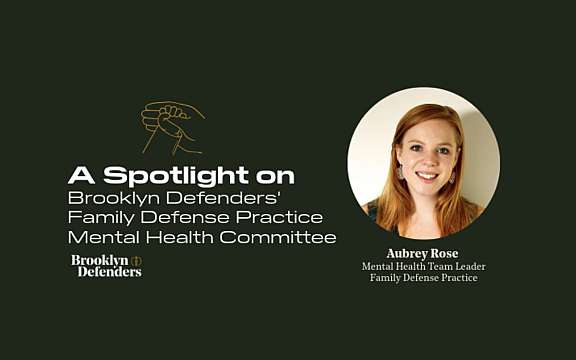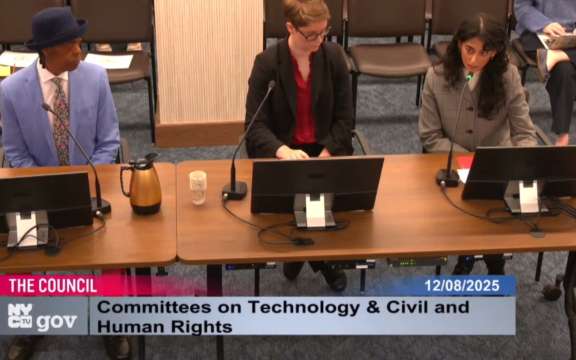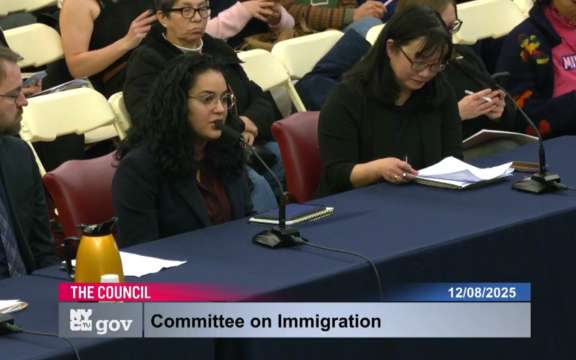BDS Testimony before New York State Senate Standing Committee on Codes And the Senate Standing Committee on Crime Victims, Crime, and Corrections regarding the End Predatory Court Fees Act
TESTIMONY OF:
Jackie Gosdigian Senior Policy Counsel
BROOKLYN DEFENDER SERVICES
Presented before The New York State Senate Standing Committee on Codes And the Senate Standing Committee on Crime Victims, Crime, and Corrections
October 13, 2021
On behalf of Brooklyn Defender Services, we would like to thank Chairman Bailey and the Senate’s Standing Committee on Codes along with Chairwoman Salazar and the Senate’s Standing Committee on Crime Victims, Crime, and Corrections, for jointly holding today’s important hearing on S.3979-C(Salazar)/A.2348-B (Niou), the End Predatory Court Fees Act, and for giving advocates and impacted community members the opportunity to share the importance of this legislation for New York State.
Brooklyn Defender Services (BDS) strongly supports the immediate passage of S.3979-C (Salazar)/A.2348-B (Niou). BDS is a multi-disciplinary and client-centered defense practice, representing clients in criminal, family, immigration, and civil legal matters. Our attorneys, social workers and advocates represent and advocate for nearly 30,000 indigent Brooklyn residents every year.
The End Predatory Court Fees Act, (S.3979-C/A.2348-B), would eliminate mandatory court surcharges, parole and probation fees, mandatory minimum fines, and end the practice of using the court system for ineffective revenue generation.
Predatory fines and fees encourage policing-for-profit, criminalize poverty, and endanger Black and brown lives. Additionally, the imposition of these fees creates a cycle of punishment and poverty, where non-payment for even low-level violations can lead to arrest and incarceration. New Yorkers deserve to live without fear of lifelong debt and poverty, and they deserve a fair, transparent government.
NEW YORK’S FISCALLY IRRESPONSIBLE AND REGRESSIVE METHOD OF RAISING REVENUE
A Heavy Reliance on the Criminal Legal System
The US Justice Department’s Ferguson Report came out over five years ago, after police in Ferguson, Missouri, killed Michael Brown, and uncovered a pattern of racially discriminatory policing practices incentivized by the city’s dependence on the criminal legal system to raise revenue. 1 The report cites the use of warrants and jail time to coerce fine and fee payments and stark racial disparities in traffic stops, citations, and arrests. This pattern of discrimination, incentivized by revenue goals, contributed to “deep mistrust between parts of the community and the police department.”2 Yet New York continues to depend on this problematic revenue source that criminalizes Black and brown New Yorkers and low-income people. In fact, thirty-four localities in New York are about as reliant or even more reliant on fines and fees for revenue than Ferguson at the time of the US Department of Justice (DOJ) investigation. 3
Racial disparities across the state mirror many of the DOJ’s findings in Ferguson. Police acting as “armed debt collectors” risk the lives of Black and brown people and extract wealth from New York’s poorest communities.4 The COVID-19 pandemic and resulting financial crisis only intensify the negative racial, economic, and health impacts of policing in pursuit of revenue.
Additionally, New York does not keep legally mandated records on how the government assesses, collects, and distributes revenue from individual fees, including the mandatory surcharge. New York also fails to maintain data reporting infrastructure to track the amounts imposed and collected for specific fees, including the mandatory surcharge and associated revenue spending. This regressive fiscal policy is long overdue for reform.5
New York’s Mandatory Surcharge Amounts to Taxation-By-Citation
Fees (or surcharges) are extra costs that the government attaches to every conviction — even traffic tickets and minor infractions. They can total hundreds of dollars (not including the amount of any fine a court may impose). Individuals are often required to pay fees on top of a fine, or even when the judge decides not to impose a fine at all. These court fees are explicitly intended as revenue raisers; they function as a form of regressive taxation on New Yorkers who are often the least able to afford them.
New York's top predatory fee is the mandatory surcharge. The mandatory surcharge is a fee attached to every conviction in New York, from minor violations to felonies.6 Courts cannot waive or reduce these fees or surcharges, or even consider your ability to pay them, and ending this practice across New York State requires legislative reform.7 Depending on the type of conviction, a single mandatory surcharge can amount to hundreds of dollars. In addition to mandatory fees, many charges come with a mandatory minimum fine, meaning that judges cannot consider someone’s ability to pay.
New York’s Court Fees Place an Undue Burden on the Poor
Fines and fees punish people living in poverty. When governments use predatory fines and fees to raise money, the result is a hidden, disproportionate tax on those who can least afford it. This system of taxation-by-citation encourages policing for profit, extracts wealth from some of the most vulnerable members of our society and exposes Black and brown New Yorkers to more encounters with police resulting in a disproportionate rate of court involvement. Fees have significant consequences, and they impact everything from housing stability to emotional well- being to relationships with friends and family. These fines and fees often force an indigent defendant, or their family, to choose between paying a fine that if unpaid would land a family member in jail, or the ability to afford rent, food, and other daily essentials.
Moreover, data shows New York has not only increased fees over time, but also made certain fees less affordable and a much greater financial burden. Since the creation of the mandatory surcharge in the 1980s, the surcharge for violations has increased 178 percent more than the expected inflation-adjusted amount. For misdemeanors and felonies, the surcharge increased 92 percent and 75 percent, respectively, relative to the inflation-adjusted amount. 8
New York’s Fines and Fees are a Racist Source of Revenue for the State
Black and brown New Yorkers are significantly more likely to be stopped, questioned, frisked, and issued summonses by police, and are living everyday with the fear of being arrested and jailed for the inability to pay a fine or fee. Harsh policing of minor violations, driven by governments’ dependence on fines and fees as revenue, does not lead to greater public safety. It instead exposes Black and brown people to unnecessary interactions with law enforcement and financial insecurity.
Moreover, jailing those unable to pay fines and fees is especially costly, and New York is wasting money to chase money that does not exist. Local jurisdictions pay the cost of enforcement and to jail someone who is unable to pay these fines and fees. Courts and law enforcement agencies are spending more time and resources than ever in unsuccessful collection efforts aimed at those least able to afford it.
IT IS TIME TO END NEW YORK’S PREDATORY COURT FEES
The End Predatory Court Fees Act, (S.3979-C/A.2348-B), addresses these injustices by first and foremost eliminating mandatory court surcharges, which is New York’s most problematic fee. Probation and parole fees would also be eliminated so a person’s ability to re-enter the community and the workplace is not burdened by further financial obligations. Additionally, the practice of garnishing the commissary accounts to pay for fines and fees would be eliminated. These accounts are held by individuals who are incarcerated, and family members contribute their hard-earned money to these accounts so that incarcerated individuals can purchase things they need while in prison. This legislation would also eliminate mandatory minimum fines and create a mechanism for judges to consider a person’s ability to pay before imposing a fine. And most significantly, this legislation would put a long overdue end to the draconian practice of incarceration for failure to pay a fine or a fee.
New York must start funding government equitably, not on the backs of those least able to afford it. New York must also regularly and transparently report any revenue imposed and collected within the legal system, including geographic and demographic data, as well as how that revenue is spent.
This inefficient, extractive, and predatory practice of imposing predatory fees has far-
reaching consequences that endanger individuals’ attempts to secure stable housing and
employment and successfully engage in society after involvement with the criminal legal system. Successful reintegration, the ability to support oneself, provide for a family benefit everyone and is something we should be promoting in our public policy in New York, not regressive laws that work to undermine the stability of individuals, families and ultimately our society.
PREDATORY COURT FEES IN PRACTICE
As public defenders we see the effects of mandatory surcharges and mandatory minimum fines firsthand. By very definition, we represent those that cannot afford an attorney, and our clients rely on us to protect their constitutional right to that representation. The fact that New York State would then in turn rely on them as a source of revenue is not only fiscally irresponsible but morally wrong. To extract money from those that come into a system, impoverished and often-times seeking help for mental health issues or substance use disorders, is inscrutable. The following are just four examples from our practice that demonstrate the impact of predatory court fees on the lives of the people we serve.
Mr. A owed a $200 fine along with a mandatory court surcharge back in 2019. In the two years since then Mr. A was unable to pay the fine or the surcharge. He has since had a new baby. A few weeks ago, Mr. A was arrested late at night inside his home, where multiple police officers barged inside, traumatizing his newborn baby and his wife, all because he couldn’t pay the $200 fine from 2019. He was brought to Brooklyn Central Booking in handcuffs, where he sat waiting until the next day to see a judge. His criminal attorney told him that all he could do was ask the judge for more time to pay the fine, otherwise Mr. A would face a jail sentence for failure to pay. Unfortunately for Mr. A, the judge did not give him more time to pay and Mr. A ended-up spending four days in Rikers Island, amidst a catastrophic humanitarian crisis9 that is currently taking place inside the New York City jail.
Mr. B owed a mandatory statutory minimum fine of $500 along with a mandatory surcharge in 2018. Even though Mr. B’s attorney informed the court that he was living in a shelter and could not pay the fine, the judge could not waive the fine because it is mandated by statute. The judge was also unable to consider Mr. B’s financial situation and his inability to pay before imposing the mandatory fine. Now, in 2021, Mr. B, who is still living in a shelter, cannot pay this fine and has made several court appearances, throughout the ongoing COVID-19 pandemic, only to have a judge tell him over and over again that the fine cannot be waived. His attorney is trying to negotiate with the District Attorney’s office so that Mr. B can withdraw his plea from 2018 and enter a plea to a different charge, one that does not have a mandatory minimum fine attached to it. Even if Mr. B’s attorney is successful at negotiating a new plea, he will still have to pay a mandatory surcharge, which must be imposed by law on virtually every traffic and criminal charge.
Ms. C was arrested for driving on a suspended license. Ms. C’s attorney advised her that her best chance of avoiding a criminal record was to pay off her tickets and have her license reinstated. Ms. C is a single mother, and despite the difficulties of taking on additional employment, she started working extra jobs to pay off her tickets. Eventually, she was able to get her license back and avoid a criminal conviction that would go on her record, but because virtually every traffic offense carries a mandatory surcharge, Ms. C is now working to pay off the surcharge. Ms. C was forced to make many of the same hard choices these predatory court fees force families to make, taking money needed for food and rent and using it to fund state government.
Mr. D was unable to pay a fine and mandatory surcharge. As a result, a warrant was issued for his arrest. Mr. D was arrested for this warrant and brought in handcuffs to Central Booking in Brooklyn, where he had to wait to see a judge so he could ask for more time to pay. The judge was not willing to give him more time to pay, and as a result he was sentenced to serve time in jail. Mr. D had to get a friend to come to the courthouse with money to pay his fine, otherwise he would have gone to jail. It is often family members or friends, who are often also struggling financially to support themselves and their families, who are forced to step in to help pay these fines and court surcharges. As a result, predatory fees not only negatively impose financial hardships on the individuals ordered to pay them, but impact their families and communities as well, perpetuating the cycle of poverty, and further preying on the poor.
No one should spend a single day in jail simply because they could not afford to pay a fine or fee. No one should be forced to choose between buying food for their family and paying a fine or a fee. New York State should not be operating debtors’ prisons, nor should the state continue to continue to forcibly extract money from the poorest communities to fund its court system.
CONCLUSION
We must end predatory court fees now. In the aftermath of the 2020 pandemic, both local governments and millions of Americans are struggling more than ever to pay for the essentials like rent and food. In other times of financial crisis, local governments have increased their reliance on mandatory fines and fees, to the detriment of their poorest citizens. But New York has an opportunity to build a more just society that does not pay for itself by preying on the poor. The End Predatory Court Fees Act is an important part of that effort.
BDS is grateful to the Senate Standing Committee on Codes and the Senate Standing Committee on Crime Victims, Crime, and Corrections for jointly hosting this important hearing and shining a spotlight this outdated and predatory practice. We must end predatory court fees now. Thank you for your time and consideration of our comments. If you have any additional questions, please contact our office at jcaruana@bds.org or 347-585-4626.
***
1 United States Department of Justice Civil Rights Division, The Ferguson Report: Department of Justice investigation of the Ferguson Police Department (2015), https://www.justice.gov/sites/default/files/opa/press- releases/attachments/2015/03/04/ferguson_police_department_report.pdf.
2 “Ferguson’s law enforcement practices are shaped by the City’s focus on revenue rather than by public safety needs. This emphasis on revenue has compromised the institutional character of Ferguson’s police department, contributing to a pattern of unconstitutional policing...Over time, Ferguson’s police and municipal court practices have sown deep mistrust between parts of the community and the police department, undermining law enforcement legitimacy among African Americans in particular.” (U.S. DOJ, The Ferguson Report (2015): 2)
3 34 localities raise 10 percent or more of their revenue through fines and fees; 12 localities raise 20 percent or more of their revenue through fines and fees. Mike Maciag, “Local Government Fine Revenues By State,” Governing, September, 2019, https://www.governing.com/gov-data/other/local-governments-high-fine-revenues- by-state.html.
4 Ariel Nelson, Wingo Smith, and Leah Nelson, “Why the Police Shouldn’t Be Armed Debt Collectors,” Governing, July 31, 2020, https://www.governing.com/now/Why-the-Police-Shouldnt-Be-Armed-Debt-Collectors.html.
5 The lead researchers for the No Price on Justice coalition along with the Fiscal Policy Institute, contacted the New York State Division of Criminal Justice Services (DCJS), the Office of Court Administration - New York Unified Court (OCA), the New York Office of the State Comptroller (OSC), the New York State Department of Taxation and Finance (DTF), and the New York State Division of Budget (DOB) in attempts to obtain data and reporting relating to the state’s mandatory surcharge, other fees, and fines. The lack of complete and transparent reporting of all imposition, collection, and disposition of the mandatory surcharge and other fee revenue suggests that government decision-making about these fees suffers from persistent data gaps, which makes the individual and community impact of fees challenging to assess and simultaneously raises questions about fiscal policy intentions. It is also in violation of New York reporting requirements. NY Crim Pro L § 420.35 (2012)
6 See New York State Penal Law, §60.35, New York State Finance Law, §97-BB, and New York State Vehicle and Traffic Law, §1809.
7 C.P.L. 420.35(2) bars courts from waiving the surcharge and ending this practice across the state calls for legislative reform.
8 Data obtained through William Donnino, Practice Commentary, McKinney’s NY Penal Law § 60.35.
9 https://theintercept.com/2021/09/16/rikers-jail-crisis-de-blasio-reforms/


